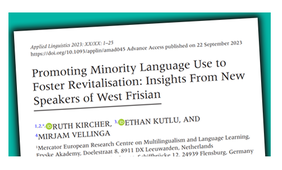New speakers’ knowledge of West Frisian does not automatically entail their use of it. This can be concluded from the new article by researchers Ruth Kircher (until April 2023 working at Mercator/Fryske Akademy, now at the European Centre for Minority Issues in Flensburg), Ethan Kutlu (University of Iowa) and Mirjam Vellinga (Afûk).
The article 'Promoting Minority Language Use to Foster Revitalisation: Insights From New Speakers of West Frisian' is one of the outcomes of the project 'New speakers of Frisian' and has now been published in the renowned scientific journal Applied Linguistics. The English-language article can be read for free by anyone (Open Access).
New speakers and traditional speakers
The findings presented in this article show that new speakers’ knowledge of West Frisian does not automatically entail their use of it. The participants in the study use West Frisian only very rarely – and when they do use it, it is mainly in the classroom. Minority language interactions outside the classroom, with traditional speakers, consist mostly of a few tokenistic words or phrases. The participants feel less comfortable when conversing in Frisian with traditional speakers than with fellow new speakers, and many participants do not feel accepted as authentic members of the minority language community.
New speakers consider several common behaviours by traditional speakers to be discouraging: namely refusing to speak Frisian from the outset of a conversation, switching to Dutch during the conversation, making fun of new speakers’ way of speaking Frisian, and unpromptedly correcting new speakers’ mistakes.
These findings are interpreted in light of the complex relationship between traditional and new speakers, in which questions of legitimacy and linguistic insecurity (amongst both groups) are highly pertinent. Yet, the findings also show that there are behaviours by traditional speakers that would encourage new speakers’ use of Frisian – namely using easy words, checking in regularly to ensure understanding, speaking slowly, and above all: explicitly encouraging new speakers to keep using Frisian.
The article discusses the implications of these findings for the promotion of new speakers’ activation, that is, the process by which new speakers become active and habitual users of the minority languages they have learnt.
The article can be found here.
About the project
'New speakers of West Frisian: Promoting language learning and use to foster revitalisation' is a collaboration between Mercator/ Fryske Akademy and Afûk. It was financed with a research grant from the Province of Fryslân to Ruth Kircher and Mirjam Vellinga.
This project focuses on new speakers of West Frisian in the province of Fryslân, in the north of the Netherlands. The participants are 264 adults who are/were enrolled in Frisian language courses at the Algemiene Fryske Ûnderrjocht Kommisje – the General Frisian Education Commission, typically abbreviated as ‘Afûk’. A questionnaire was used to gather quantitative as well as qualitative data regarding these new speakers’ motivations for learning West Frisian, their attitudes towards the language, their ideological evaluations of its different varieties, and their language use patterns.
The project findings are written up in three academic articles, all of which discuss the implications of the findings for potential language planning measures to encourage the learning and/or use of West Frisian amongst new speakers. Moreover, the project outputs include research-informed teaching materials for Afûk educators, a research report for the government of the Province of Fryslân, and a research-informed language promotion campaign.
You can find more information about this project on the special project web page.



